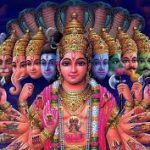 Purusha meant “man” and later by extension “soul” or “consciousness.” It was utilized both in Hindu mythology and philosophy—often in quite divergent ways. In the various philosophical-theological schools (darsanas), purusha shared contexts with atman (self), brahman (Absolute), kshetrajna (the knower of the field). In the great creation hymn of the Rigveda (10.90), purusha was clearly the first one, linked to its desire for and actual materialization (prakriti). In the later Vedic period, especially the Upanishads, purusha is pure consciousness (cit) and pure self (atman) alone without materiality (prakriti). The universal self or Absolute (brahman) came to replace purusha completely.
Purusha meant “man” and later by extension “soul” or “consciousness.” It was utilized both in Hindu mythology and philosophy—often in quite divergent ways. In the various philosophical-theological schools (darsanas), purusha shared contexts with atman (self), brahman (Absolute), kshetrajna (the knower of the field). In the great creation hymn of the Rigveda (10.90), purusha was clearly the first one, linked to its desire for and actual materialization (prakriti). In the later Vedic period, especially the Upanishads, purusha is pure consciousness (cit) and pure self (atman) alone without materiality (prakriti). The universal self or Absolute (brahman) came to replace purusha completely.
In mythology purusha became a synonym for Brahma, the creator, and then for the supreme being, either Vishnu or Siva.
